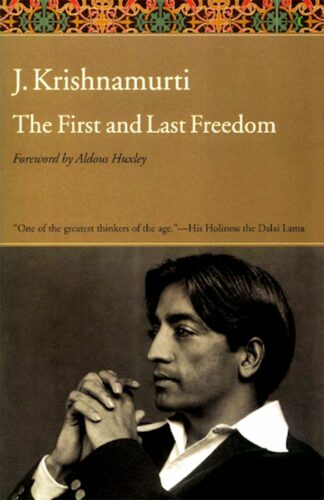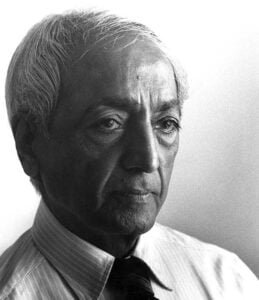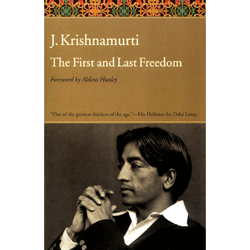The First and Last Freedom by J. Krishnamurti

The First and Last Freedom
In The First and Last Freedom J. Krishnamurti cuts away symbols and false associations in the search for pure truth and perfect freedom. Through discussions on suffering, fear, gossip, sex and other topics, Krishnamurti’s quest becomes the readers, an undertaking of tremendous significance. A second part (“Questions and Answers”) consists of 38 named segments, taken from question-and-answer sessions between Krishnamurti and his audience; the segments broadly pertain to the topics covered in the book’s first part.
Book Details
Author: J. Krishnamurti
Print Length: 299
Publisher: HarperOne
Original source: www.Jiddu-Krishnamurti.net
Book format: Pdf, ePub, Kindle
Language: English
Book Download
Contents
- Foreword by Aldous Huxley
- Chapter 1. Introduction
- Chapter 2. What are We Seeking?
- Chapter 3. Individual and Society
- Chapter 4. Self-Knowledge
- Chapter 5. Action and Idea
- Chapter 6. Belief
- Chapter 7. Effort
- Chapter 8. Contradiction
- Chapter 9. What is The Self?
- Chapter 10. Fear
- Chapter 11. Simplicity
- Chapter 12. Awareness
- Chapter 13. Desire
- Chapter 14. Relationship and Isolation
- Chapter 15. The Thinker and The Thought
- Chapter 16. Can Thinking Solve our Problems?
- Chapter 17. The Function of The Mind
- Chapter 18. Self-Deception
- Chapter 19. Self-Centred Activity
- Chapter 20. Time and Transformation
- Chapter 21. Power and Realization
Questions and Answers
- Question 1: On The Present Crisis
- Question 2: On Nationalism
- Question 3: Why Spiritual Teachers?
- Question 4: On Knowledge
- Question 5: On Discipline
- Question 6: On Loneliness
- Question 7: On Suffering
- Question 8: On Awareness
- Question 9: On Relationship
- Question 10: On War
- Question 11: On Fear
- Question 12: On Boredom and Interest
- Question 13: On Hate
- Question 14: On Gossip
- Question 15: On Criticism
- Question 16: On Belief In God
- Question 17: On Memory
- Question 18: Surrender to “What Is”
- Question 19: On Prayer and Meditation
- Question 20: On The Conscious and Unconscious Mind
- Question 21: On Sex
- Question 22: On Love
- Question 23: On Death
- Question 24: On Time
- Question 25: On Action Without Idea
- Question 26: On The Old and The New
- Question 27: On Naming
- Question 28: On The Known and The Unknown
- Question 29: Truth and Lie
- Question 30: On God
- Question 31: On Immediate Realization
- Question 32: On Simplicity
- Question 33: On Superficiality
- Question 34: On Triviality
- Question 35: On The Stillness of The Mind
- Question 36: On The Meaning of Life
- Question 37: On The Confusion of The Mind
- Question 38: On Transformation
Sample
The First and Last Freedom
WHAT ARE WE SEEKING?
What is it that most of us are seeking? What is it that each one of us wants? Especially in this restless world, where everybody is trying to find some kind of peace, some kind of happiness, a refuge, surely it is important to find out, isn’t it?, what it is that we are trying to seek, what it is that we are trying to discover. Probably most of us are seeking some kind of happiness, some kind of peace; in a world that is ridden with turmoil, wars, contention, strife, we want a refuge where there can be some peace. I think that is what most of us want. So we pursue, go from one leader to another, from one religious organization to another, from one teacher to another.
Now, is it that we are seeking happiness or is it that we are seeking gratification of some kind from which we hope to derive happiness? There is a difference between happiness and gratification. Can you seek happiness? Perhaps you can find gratification but surely you cannot find happiness. Happiness is derivative; it is a by-product of something else. So, before we give our minds and hearts to something which demands a great deal of earnestness, attention, thought, care, we must find out, must we not?, what it is that we are seeking; whether it is happiness, or gratification. I am afraid most of us are seeking gratification. We want to be gratified, we want to find a sense of fullness at the end of our search.
After all, if one is seeking peace one can find it very easily. One can devote oneself blindly to some kind of cause, to an idea, and take shelter there. Surely that does not solve the problem. Mere isolation in an enclosing idea is not a release from conflict. So we must find, must we not?, what it is, inwardly, as well as outwardly, that each one of us wants. If we are clear on that matter, then we don’t have to go anywhere, to any teacher, to any church, to any organization. Therefore our difficulty is, to be clear in ourselves regarding our intention, is it not? Can we be clear? And does that clarity come through searching, through trying to find out what others say, from the highest teacher to the ordinary preacher in a church round the corner? Have you got to go to somebody to find out? Yet that is what we are doing, is it not? We read innumerable books, we attend many meetings and discuss, we join various organizations – trying thereby to find a remedy to the conflict, to the miseries in our lives. Or, if we don’t do all that, we think we have found; that is we say that a particular organization, a particular teacher, a particular book satisfies us; we have found everything we want in that; and we remain in that, crystallized and enclosed.
Do we not seek, through all this confusion, something permanent, something lasting, something which we call real, God, truth, what you like – the name doesn’t matter, the word is not the thing, surely. So don’t let us be caught in words. Leave that to the professional lecturers. There is a search for something permanent, is there not?,in most of us – something we can cling to, something which will give us assurance, a hope, a lasting enthusiasm, a lasting certainty, because in ourselves we are so uncertain. We do not know ourselves. We know a lot about facts, what the books have said; but we do not know for ourselves, we do not have a direct experience.
And what is it that we call permanent? What is it that we are seeking, which will, or which we hope will give us permanency? Are we not seeking lasting happiness, lasting gratification, lasting certainty? We want something that will endure everlastingly, which will gratify us. If we strip ourselves of all the words and phrases, and actually look at it, this is what we want. We want permanent pleasure, permanent gratification – which we call truth, God or what you will.
Truth is a pathless land. Man cannot come to it through any organisation, through any creed, through any dogma, priest or ritual, nor through any philosophic knowledge or psychological technique. He has to find it through the mirror of relationship, through the understanding of the contents of his own mind, through observation and not through intellectual analysis or introspective dissection.About Author: J. Krishnamurti
 J. Krishnamurti (1895-1986) is widely regarded as one of the greatest thinkers and religious teachers of all time. He spoke throughout the world to large audiences and to individuals including writers, scientists, philosophers and educators, about the need for a radical change in mankind. Asked to describe what lay at the heart of his teaching, he said:
J. Krishnamurti (1895-1986) is widely regarded as one of the greatest thinkers and religious teachers of all time. He spoke throughout the world to large audiences and to individuals including writers, scientists, philosophers and educators, about the need for a radical change in mankind. Asked to describe what lay at the heart of his teaching, he said:


Leave a Reply
Want to join the discussion?Feel free to contribute!